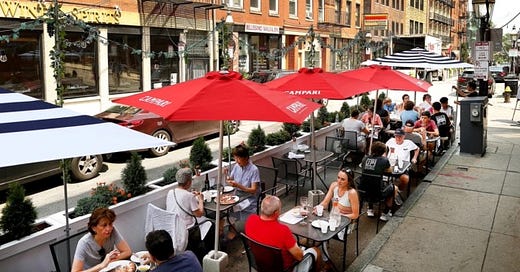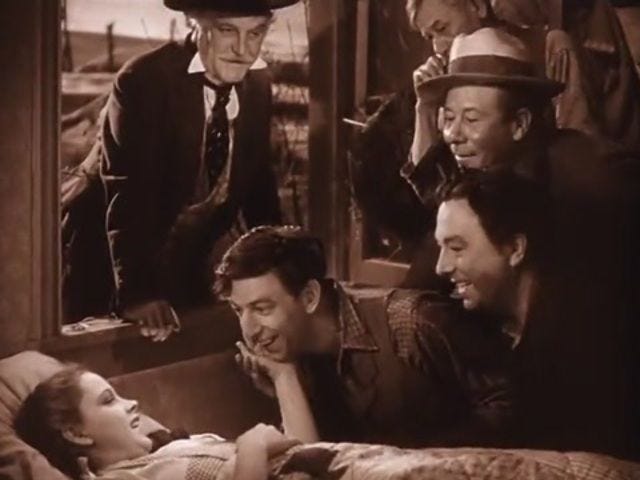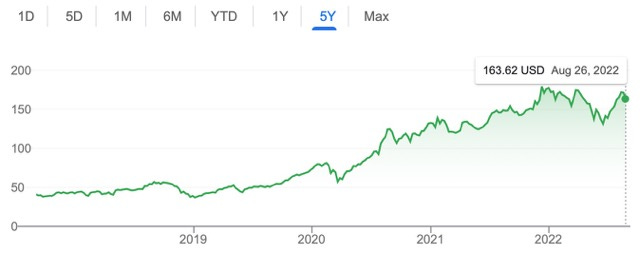Welcome to the Quarantine Creatives newsletter, a companion to my podcast of the same name, which explores creativity, art, and big ideas as we continue to live through this pandemic.
If you like what you’re reading, you can subscribe for free to have this newsletter delivered to your inbox on Wednesdays and Sundays:
The best movies involve an unexpected situation which leads to a change in the protagonist. In The Wizard of Oz, after Dorothy is unexpectedly transported to the Technicolor land of Oz, she must stand up to a powerful wizard and defeat a wicked witch. She learns that she is braver than she ever thought. Dorothy also realizes that even though she tried to escape her life on a Kansas farm, she really had everything she needed there the whole time.
We have no idea what happens to the characters after the end credits roll, but I think there would be some disappointment if we found out that a few days after cleaning up from the tornado, Dorothy was again seeking adventure “over the rainbow,” despite swearing a few days earlier that “there’s no place like home.” We saw how the journey of the film changed her for the better, and we like to hope that those changes stuck.
Sometimes I feel like the past two and a half years have been a movie. The pandemic was dropped on us out of thin air, like a house falling on a wicked witch. It kickstarted a series of events that we could not have anticipated. For much of this journey, people have been waiting for the moment when they can return “home,” which means back to life pre-pandemic.
As it feels like this pandemic movie may be wrapping up soon, I’ve been reflecting on all that we’ve been through in this period, and hoping that our next chapter as a society builds upon lessons from this time, instead of simply trying to go back to how we were.
Today I wanted to share some things that I think have made us better over the last two and a half years, and that I hope we don’t lose sight of in the near future.
Making Do With Less
In the early days of the pandemic, it wasn’t even clear if it was safe to shop. It didn’t matter much, because store shelves were bare. Toilet paper, yeast, and hand sanitizer were suddenly out of stock, forcing people to improvise.
As the pandemic wore on, supply chain disruptions slowed the speed of imports and made many products hard to find, especially new cars and other items with microchips.
Consumers trained on instant gratification had to learn to wait. We could no longer expect a delivery in a matter of hours; it would show up when it showed up.
Many of us became inventive during this time, rediscovering older techniques for self-sufficiency that seemed lost to our generation. We cooked more meals at home, gardened for food production, and canned the surplus crops. Baking sourdough at home was another big trend, which requires only flour, water, and salt.
I started baking sourdough at the start of the pandemic, but when we started following a new diet last fall, I no longer could eat gluten and stopped the practice. But my wife recently discovered a gluten free/lectin free technique for creating a sourdough starter and baking sourdough bread, and I was able to bake my first loaf of this new style yesterday. I missed baking bread and am glad I am able to continue doing it.
I learned that I was capable of much more than I ever thought over the last two years. I made fresh pasta, rolled my own tortillas, and used leftover chicken bones to boil my own stock. I am not eager to go back to a life of consumerism and instant gratification, and I hope our society is slow to return to that too.
Supporting Local
In a similar vein, when national grocery chains had a hard time stocking items, I found local businesses really stepped up and filled the gap.
One of the local farms I frequent (Codman Community Farms in Lincoln, MA) used to have a small self-service shop with meat and eggs before the pandemic.
In 2020, Codman greatly expanded their retail footprint to fill the gap that local grocers couldn’t. They now offer produce from local farms, mushrooms, fermented foods like sauerkraut and kimchi, tons of dairy, and more. It’s now possible for me to do most of my grocery shopping at local farms like this, with the grocery store only contributing specialty items like flours, condiments, and packaged foods.
We also weren’t traveling much during the pandemic. When we needed to unwind or recharge, we made several day trips to local beaches, explored local campgrounds, and rented AirBnBs within a close radius, rather than boarding a plane and vacationing far away.
We’ve started to venture outside of our immediate area with our RV (I think we’ve now stayed in 15 states in the last year), but the pace of a road trip and the ability to interact with local attractions is so different from taking a plane somewhere. I like being able to see the world from the ground, and expect that more of our vacations will involve an interstate rather than a passport for some time to come. America is a big, beautiful country and I want to see more of it.
The world has become smaller and more interdependent in my lifetime, with economies built upon importing and shipping items across international borders. We will never be able to fully disconnect from that global system, but I hope we can continue to prioritize local as we move forward.
Streetscapes
Our streets used to be built for cars and only cars. When it became clear that COVID was an airborne disease and restaurants could be at a higher risk for transmission, lots of cities improvised.
Outdoor dining has now become a fixture at restaurants across the country. These patios are often makeshift. They are built in reclaimed parallel parking spaces or involve a few tables added to a surface parking lot in a strip mall. They feel like a temporary solution, except they’re actually a really nice way to enjoy a meal.
Along with opening up areas to outdoor seating that typically housed cars, some cities have closed entire streets off to vehicular traffic, making a pedestrian friendly boulevard.
I do not miss sitting in a dark, air conditioned restaurant and much prefer the experience of being outdoors. I hope that the temporary law changes that permitted these outdoor dining and walking spaces can remain a part of how we view our cities, and that we can look for ways to make these improvised solutions more permanent.
Working from Anywhere
There is a lot of tension right now between workers in white collar office jobs and management, as companies are hoping return to office plans this fall will finally be permanent.
Apple, for example, is requiring three days in the office per week, beginning in September. What these mandates fail to take into account is that workers have been quite productive during the last two years, whether working from home, a local coffee shop, or a beach resort.
Apple’s stock has doubled since the start of the pandemic, despite its workforce not being in person for much of that time. Even if CEOs feel like productivity is down, the data doesn’t show that for many companies.
I’m not sure what’s driving CEO reluctance to working remotely. Collaboration and creativity can still happen over a computer, it just may need to be scheduled and less spontaneous.
Working remotely has big benefits for work-life balance for the employee. But it’s also a giant benefit to society, by pulling cars that used to commute to an office off the road.
At a time when climate concerns are sky-high and technology allows for productivity from anywhere, it’s disappointing to see so many CEOs mandating schedules, when workers are clamoring for the opposite.
I’m not sure how this will play out, but as I’ve said many times, the companies that embrace the lessons of the last two years and realize that flexibility worked, will be best positioned for future success.
Racial Justice
Finally, I wanted to touch on the issue of racial justice. 2020 was the year that issues of racial bias could no longer be ignored. COVID disproportionately affected Black and Brown communities. The police killing of George Floyd prompted nationwide protests and caused Americans to confront the issue of police violence. The Unite the Right rally in Charlottesville saw Americans opening marching under Nazi flags.
Racial discrimination has touched everything from housing and transit policy to employment, incarceration, and economic opportunity, yet the racial component to these issues was always shrouded in euphemism and treated like the elephant in the room that nobody was willing to openly discuss.
George Floyd changed that, and is forcing a conversation about racial justice and fairness. Books like The Sum of Us by Heather McGhee explain the racist policies that got us to this point and paint a path forward.
At the same time, popular media has shown that diversity is a winning strategy. Shows like Kim’s Convenience, Never Have I Ever, and Rutherford Falls and movies like Black Panther and Shang-Chi and the Legend of the Ten Rings have told the stories of non-white heroes and been successful.
I hope that the momentum of this movement continues to grow and we can keep moving towards a more equitable and fair society that no longer overlooks the issues of the past, but instead moves to make things better.
I’m not sure if the entire pandemic story is coming to a close or if we are just at the end of this chapter but the saga will continue. Either way, I hope that we will keep the lessons we have learned over the last two and a half years with us as we move forward to whatever awaits us.
What are your thoughts? Are there aspects of the pandemic that you are ready to move beyond? What lessons do you want us to carry forward as a society? Leave a comment and let’s have a conversation!
Related Reading
Wednesday Walk: Quiet Quitting
If you’d like to catch up on past episodes of the Quarantine Creatives podcast, they can be found on Apple Podcasts, Spotify, or wherever you listen.
Please consider sharing this with a friend that you think might enjoy it, or better yet, share it on social media so you can tell hundreds of friends!
If you’ve missed past issues of this newsletter, they are available to read here.
Stay Safe!
Heath









Hi, Heath!
It’s Somer Rini! I’ve been keeping up with your articles and I see you’re just as gifted as ever. I just wanted to say hello and I’m so happy that you have turned the interests/gifts you have had since you were very young into a long and successful career. Super proud of you and I’m sure Mrs. Domizi probably is too! 😊